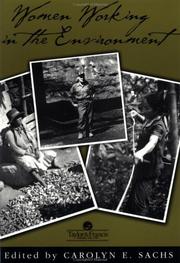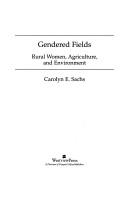| Listing 1 - 10 of 10 |
Sort by
|

ISBN: 1560326298 9781560326298 Year: 1997 Publisher: Bristol Taylor & Francis
Abstract | Keywords | Export | Availability | Bookmark
 Loading...
Loading...Choose an application
- Reference Manager
- EndNote
- RefWorks (Direct export to RefWorks)
Ecofeminism. --- Sexual division of labor. --- Women and the environment. --- Women in development. --- Agronomy --- Sociology of the family. Sociology of sexuality --- Sociology of work --- Hunting. Fishery. Aquaculture --- Sociology of occupations --- Sociology of the developing countries --- Forestry --- Environmental protection. Environmental technology --- Developing countries --- Women in development --- Ecofeminism --- Sexual division of labor --- Environmental aspects --- Women in development - Environmental aspects --- Agricultural sector --- Climate --- Sexual division of labour --- Fishery --- Book

ISBN: 0813325196 081332520X 9780813325200 9780813325194 Year: 1996 Publisher: Boulder : WestviewPress,
Abstract | Keywords | Export | Availability | Bookmark
 Loading...
Loading...Choose an application
- Reference Manager
- EndNote
- RefWorks (Direct export to RefWorks)
Book
ISBN: 9780367728557 9781138384941 9780429427381 0429427387 9780429763816 0429763816 9780429763809 0429763808 9780429763823 0429763824 0367728559 1138384941 Year: 2019 Publisher: London Routledge
Abstract | Keywords | Export | Availability | Bookmark
 Loading...
Loading...Choose an application
- Reference Manager
- EndNote
- RefWorks (Direct export to RefWorks)
Sociology of the family. Sociology of sexuality --- Agriculture. Animal husbandry. Hunting. Fishery --- Asia --- Africa --- Latin America --- Women in agriculture --- Agrarian society --- Gender roles --- Agricultural sector --- Book --- Ecology
Book
Year: 1996 Publisher: Boulder Westview Press
Abstract | Keywords | Export | Availability | Bookmark
 Loading...
Loading...Choose an application
- Reference Manager
- EndNote
- RefWorks (Direct export to RefWorks)
Dit boek schetst de gevolgen van de globalisering van de economie voor plattelandsvrouwen, zowel in geïndustrialiseerde als ontwikkelingslanden. De auteur spitst zich hierbij toe op enkele aspecten van het plattelandsleven: het bezit en vruchtgebruik van grond, de oogst en het werken met dieren. De ervaringen van plattelandsvrouwen worden niet enkel beschouwd in termen van hun sekse, maar ook in termen van sociale klassen en etniciteit. Aan de hand van historisch onderzoek, schriftelijke getuigenissen van plattelandsvrouwen en diepte-interviews bewijst de auteur dat de vernieling van het leefmilieu en de economische ontwikkeling ten gevolge van de globalisering de sociale en economische positie van plattelandsvrouwen vaak meer kwaad dan goed doen. Het boek eindigt met een optimistische noot: de pogingen van steeds meer vrouwen om zich te verenigen en zich samen te verzetten tegen trends en praktijken die hun bestaan op de helling zetten.
Sociology of the family. Sociology of sexuality --- Sociology of work --- Development aid. Development cooperation --- Economics --- Agronomy --- Agricultural sector --- Development policy --- Sexual division of labour --- Rural areas --- Book --- Ecofeminism --- Economy
Book
ISBN: 0429576358 0429199759 0429578466 9780429199752 9780429576355 9780429578465 9780429574245 042957424X 9780367190019 036719001X 0367563568 Year: 2021 Publisher: Abingdon, Oxon ; New York, NY : Routledge,
Abstract | Keywords | Export | Availability | Bookmark
 Loading...
Loading...Choose an application
- Reference Manager
- EndNote
- RefWorks (Direct export to RefWorks)
"The Routledge Handbook of Gender and Agriculture covers major theoretical issues as well as critical empirical shifts in gender and agriculture. Gender relations in agriculture are shifting in most regions of the world with changes in the structure of agriculture, the organization of production, international restructuring of value chains, climate change, and national and multinational policy changes. This book provides a cutting-edge assessment of the field of gender and agriculture, with contributions from both leading scholars and up and coming academics as well as policymakers and practitioners. The handbook is organised into four parts: Part 1, Institutions, Markets, and Policies, Part 2, Land, Labor, and Agrarian Transformations, Part 3, Knowledge, Methods, and Access to Information, and Part 4. Farming People and Identities. Chapters address both historical subjects as well as ground-breaking work on gender and agriculture which will help to chart the future of the field. The handbook has an international focus with contributions examining issues at both the global and local level with contributors from across the world. With contributions from leading academics, policymakers and practitioners, and with a global outlook, the Routledge Handbook of Gender and Agriculture is an essential reference volume for both scholars, students and practitioners interested in gender and agriculture"--
Agriculture --- Farming --- Husbandry --- Industrial arts --- Life sciences --- Food supply --- Land use, Rural --- Economic aspects --- Land use --- Women in agriculture --- Planning --- Agriculture - Economic aspects - Case studies --- Land use - Planning - Case studies --- Women in agriculture - Case studies --- Nature, Ecology, Agriculture, Gender and Development
Book
ISBN: 1003198279 1000515249 1032055987 Year: 2021 Publisher: [Place of publication not identified] : Routledge,
Abstract | Keywords | Export | Availability | Bookmark
 Loading...
Loading...Choose an application
- Reference Manager
- EndNote
- RefWorks (Direct export to RefWorks)
This book documents how COVID-19 impacts gender, agriculture, and food systems across the globe with on-the-ground accounts and personal reflections from scholars, practitioners, and community members.
Book
Year: 2022 Publisher: [Place of publication not identified] : Taylor & Francis,
Abstract | Keywords | Export | Availability | Bookmark
 Loading...
Loading...Choose an application
- Reference Manager
- EndNote
- RefWorks (Direct export to RefWorks)
This book documents how COVID-19 impacts gender, agriculture, and food systems across the globe with on-the-ground accounts and personal reflections from scholars, practitioners, and community members. During the coronavirus pandemic with many people under lockdown, continual agricultural production and access to food remain essential. Women provide much of the formal and informal work in agriculture and food production, distribution, and preparation often under precarious conditions. A cadre of scholars and practitioners from across the globe provide their timely observations on these issues as well as more personal reflections on its impact on their lives and work. Four major themes emerge from these accounts and are interwoven throughout: the pervasiveness of food insecurity, the ubiquity of women's care work, food justice, and policies and research that can that can result in a resilience that reimagines the future for greater gender and intersectional equality. We identify what lessons we can learn from this global pandemic about research and practices related to gender, food, and agricultural systems to strive for more equitable arrangements. This book will be of great interest to students, scholars and practitioners working on gender and food and agriculture during this global pandemic and beyond.
COVID-19 (Disease) --- Economic aspects. --- Social aspects.
Book
Year: 2022 Publisher: [Place of publication not identified] : Taylor & Francis,
Abstract | Keywords | Export | Availability | Bookmark
 Loading...
Loading...Choose an application
- Reference Manager
- EndNote
- RefWorks (Direct export to RefWorks)
This book documents how COVID-19 impacts gender, agriculture, and food systems across the globe with on-the-ground accounts and personal reflections from scholars, practitioners, and community members. During the coronavirus pandemic with many people under lockdown, continual agricultural production and access to food remain essential. Women provide much of the formal and informal work in agriculture and food production, distribution, and preparation often under precarious conditions. A cadre of scholars and practitioners from across the globe provide their timely observations on these issues as well as more personal reflections on its impact on their lives and work. Four major themes emerge from these accounts and are interwoven throughout: the pervasiveness of food insecurity, the ubiquity of women's care work, food justice, and policies and research that can that can result in a resilience that reimagines the future for greater gender and intersectional equality. We identify what lessons we can learn from this global pandemic about research and practices related to gender, food, and agricultural systems to strive for more equitable arrangements. This book will be of great interest to students, scholars and practitioners working on gender and food and agriculture during this global pandemic and beyond.
COVID-19 (Disease) --- Economic aspects. --- Social aspects.
Book
Year: 2022 Publisher: [Place of publication not identified] : Taylor & Francis,
Abstract | Keywords | Export | Availability | Bookmark
 Loading...
Loading...Choose an application
- Reference Manager
- EndNote
- RefWorks (Direct export to RefWorks)
This book documents how COVID-19 impacts gender, agriculture, and food systems across the globe with on-the-ground accounts and personal reflections from scholars, practitioners, and community members. During the coronavirus pandemic with many people under lockdown, continual agricultural production and access to food remain essential. Women provide much of the formal and informal work in agriculture and food production, distribution, and preparation often under precarious conditions. A cadre of scholars and practitioners from across the globe provide their timely observations on these issues as well as more personal reflections on its impact on their lives and work. Four major themes emerge from these accounts and are interwoven throughout: the pervasiveness of food insecurity, the ubiquity of women's care work, food justice, and policies and research that can that can result in a resilience that reimagines the future for greater gender and intersectional equality. We identify what lessons we can learn from this global pandemic about research and practices related to gender, food, and agricultural systems to strive for more equitable arrangements. This book will be of great interest to students, scholars and practitioners working on gender and food and agriculture during this global pandemic and beyond.
COVID-19 (Disease) --- Economic aspects. --- Social aspects.
Book
ISBN: 9781609384166 1609384164 1609384156 9781609384159 Year: 2016 Publisher: Iowa City [Iowa]
Abstract | Keywords | Export | Availability | Bookmark
 Loading...
Loading...Choose an application
- Reference Manager
- EndNote
- RefWorks (Direct export to RefWorks)
A profound shift is occurring among women working in agriculture - they are increasingly seeing themselves as farmers, not only as the wives or daughters of farmers. In this book, farm women in the northeastern United States describe how they got into farming and became successful entrepreneurs despite the barriers they encountered in agricultural institutions, farming communities, and even their own families. The authors' feminist agrifood systems theory (FAST) values women's ways of knowing and working in agriculture and has the potential to shift how farmers, agricultural professionals, and anyone else interested in farming think about gender and sustainability, as well as to change how feminist scholars and theorists think about agriculture.--Cover
Women farmers. --- Sustainable agriculture. --- Low-input agriculture --- Low-input sustainable agriculture --- Lower input agriculture --- Resource-efficient agriculture --- Sustainable farming --- Agriculture --- Alternative agriculture --- Women as farmers --- Farmers --- Rural women --- Women in agriculture
| Listing 1 - 10 of 10 |
Sort by
|

 Search
Search Feedback
Feedback About UniCat
About UniCat  Help
Help News
News